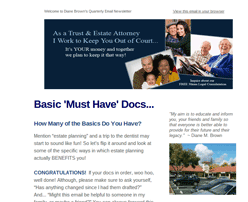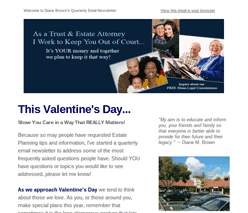Elder Care – Signs of Financial Abuse
Categories: Elder Care, Identity Theft, Senior Scams & Fraud
 Throughout the past couple years, we’ve examined just how vulnerable our seniors are in this increasingly technological world. In earlier blog posts: Scams & Frauds – Get Smart and Tis the Season for Scammers, we looked at many of the most prevalent cons out there.
Throughout the past couple years, we’ve examined just how vulnerable our seniors are in this increasingly technological world. In earlier blog posts: Scams & Frauds – Get Smart and Tis the Season for Scammers, we looked at many of the most prevalent cons out there.
Because the elderly make such easy prey, this is a very important topic. In this article and in the one next month, we focus on financial abuse as it pertains to seniors in specific. We let you know how to spot the danger signs and show you what you can do about it!
You have likely heard about Medicare and insurance scams, reverse mortgage cons, home-repair scams, investment scams, identity theft, IRS scams, lottery scams, and charity cons. This last scam, embezzlement via check fraud, gives you a hint at something I think is really going to surprise you!
According to AARP, The National Center on Elder Abuse reports that, “90 percent of the perpetrators are family members or people the victims know well, such as neighbors, friends or caregivers.” That’s scary, however, when you are informed and know what you to be on the look-out for, it can ALSO be very empowering! Do you know what to look for?
Top 15 Reasons the Elderly are Targeted for Financial Fraud
- More likely to have cash in the bank and good credit
- More likely to own their home
- Increasing inability to keep track of financial details
- Often lose track of bank accounts, lock boxes, investment accounts, and hiding spots for cash
- Can be less likely to notice something of value is missing
- Generationally speaking, they are more likely to be polite
- Certain elderly women can be overly trusting of authoritative men
- More easily distracted, confused, and less likely to say no
- Less likely to report fraud to authorities
- May protect thief or tolerate theft from caregiver for fear losing their ability to live in their home
- Likely to be less technologically savvy
- More likely to respond to click-bait and fraudulent requests for personal information
- Often reluctant to tell friends and family when fraud occurs
- Can be less reliable as witnesses in court
- Likely to react reflexively to situations that threaten their family, financial stability, or health
What are the Early Red Flags of Financial Abuse?
There are the Red Flags that need to serve as your Early Warning System. As you begin to see a couple of these, start looking for more! The more red flags you see, the more you need to pay very close attention to the financial affairs of your elderly loved one.
It’s time to monitor things when you see:
PHYSICAL RED FLAGS
- Mental decline
- Significant memory changes
- Decreased mobility and agility
- Frailty, obvious injury, use of cane, wearing a visible brace, obvious reduced vision, or impaired hearing
FINANCIAL RED FLAGS
- Significant decrease in their ability to balance their checkbook, pay bills, or track financial details
- Increase in late payment notices and missed payments
- Bank or credit card statements that no longer come to the senior’s home
- Increase in account overdrafts, non-sufficient funds activity, and voided checks
- Large cash withdrawals from the bank – even ones that appear official and above board
- Frequent small or occasional irregular withdrawals that the account owner does not remember making
- Credit card or bank payments to companies and services and checks written as a “loan” or “gift”
- Closing out CDs or bank accounts and changes to a will or trust
- Missing checks in checkbook with no notation in check register
RELATIONSHIP RED FLAGS
- Strangers who befriend your elderly relative
- Friends or family who deliberately isolate the senior from their family and friends
- People who play up to a senior’s loneliness
- People who leverage a shared community (church, activity, group) to gain trust
- A relative, friend, or caretaker who suddenly handles financial transactions for older person
- Relatives who live in the senior’s home have regular access to the senior’s mail, personal account information, and private personal and financial documents like their social security card, driver’s license, and passport.
- Sudden lifestyle improvement of attentive relative, friend, or caretaker – In a 2015 Elder Abuse article in the New England Journal of Medicine, it was stated, “Perpetrators are most likely to be adult children or spouses, and they are more likely to be male, to have a history of past or current substance abuse, to have mental or physical health problems, to have a history of trouble with the police, to be socially isolated, to be unemployed or have financial problems, and to be experiencing major stress.” In the same article, it is noted that, “Most studies indicate that older women are more likely than older men to be victims of abuse.
OTHER RED FLAGS
- Increase in missed appointments and dates with friends
- Your elder relative lives a good distance from family and does not have regular contact with friends and family members
- Ritual focus on the same topic at some point in every conversation – “I need to: clean out my purse, I really must organize my desk, I have got to put away these piles, or I need to organize my workbench.”
What You Can Do & Tips to Keep Seniors Safe
Keeping your aging parent or elderly loved one safe from financial abuse may feel like an uphill climb and full-time job. The good news is that there is PLENTY you can do and there are so many resources you have at your fingertips!
In next month’s post, we will look at some pro-active, protective actions you can take now to to Keep Seniors Safe from Financial Abuse and as soon as we can, we’ll compile and share some specific resources to help you do an awesome job!
UPDATE – CLICK HERE for the List of Online Resources!
 Diane M. Brown, Esq.
Diane M. Brown, Esq.
Working every day to keep my clients out of court!
It’s your money… Let’s keep it that way!
Call 408-364-1234
This blog contains general information and is not meant to apply to a specific situation. Please seek advice of counsel before proceeding as each case is unique.






No comments yet.